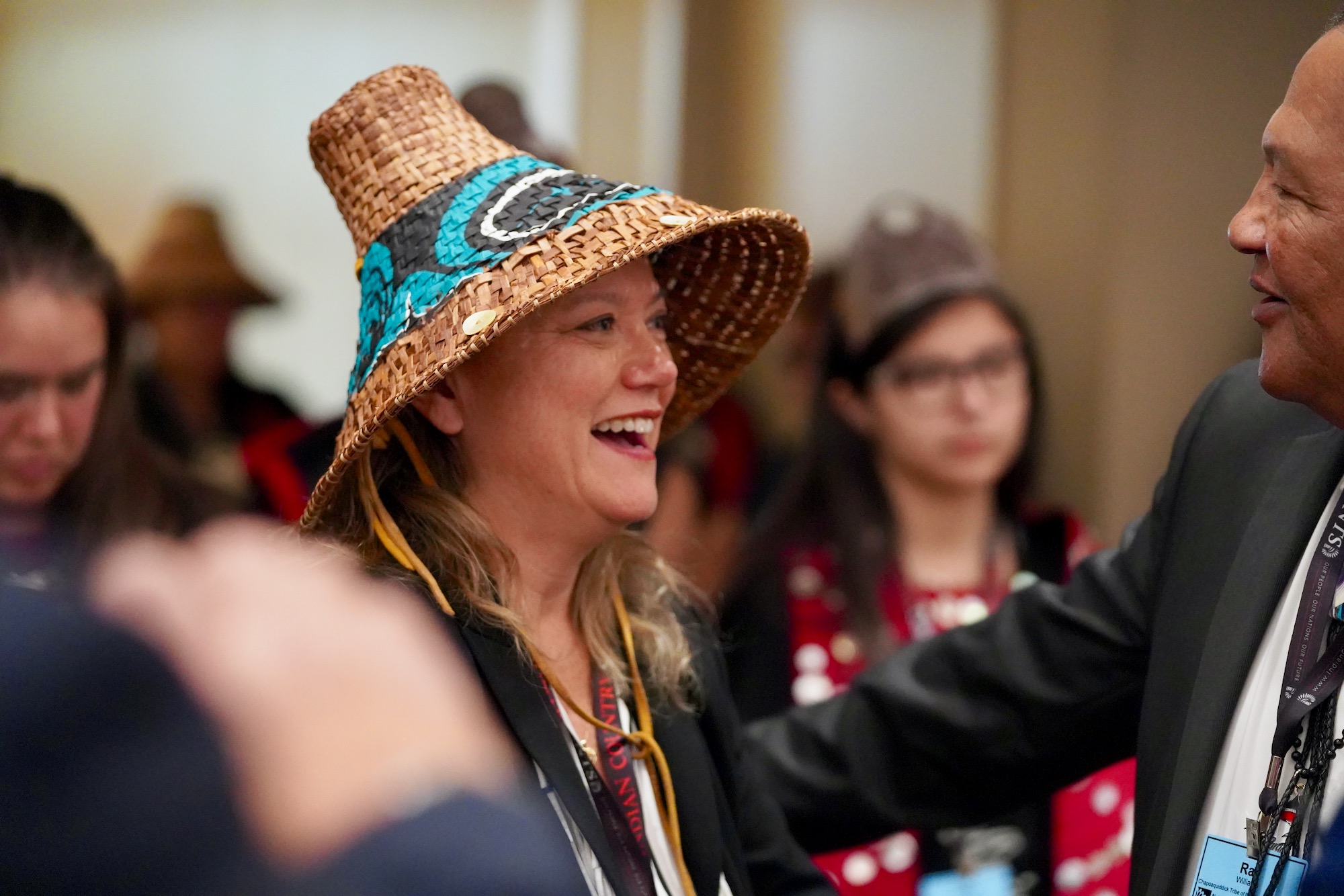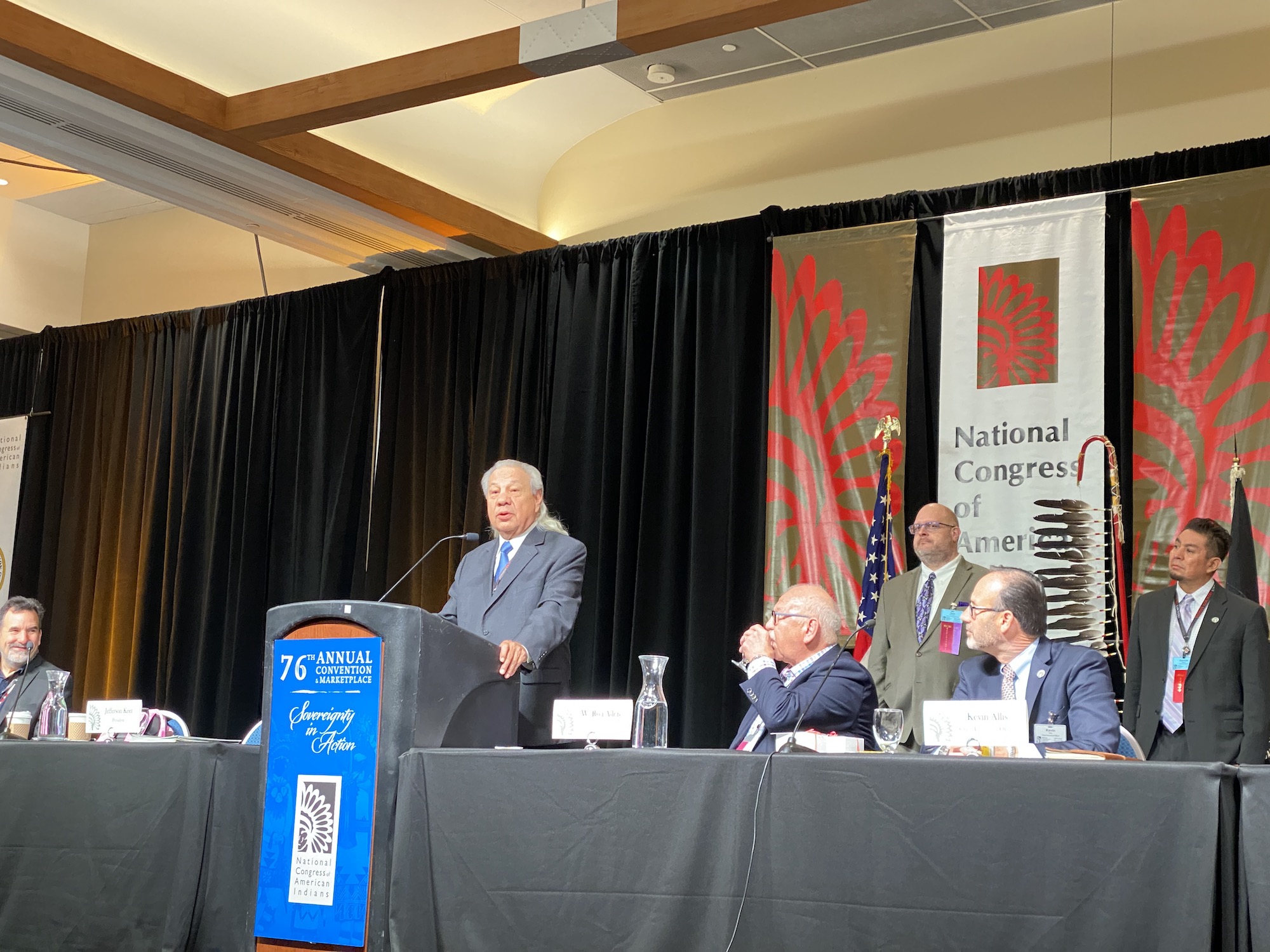
Fawn Sharp, the president of the Quinault Nation, is congratulated after winning election as the new president of the National Congress of American Indians at the organization’s 76th annual convention in Albuquerque, New Mexico, on October 24, 2019. Photo by Kevin Abourezk
FOR IMMEDIATE RELEASE: July 9, 2020
Historic Win in McGirt v. Oklahoma
The National Congress of American Indians (NCAI), the nation’s oldest, largest, and most representative organization comprised of American Indian and Alaska Native tribal nations and their citizens, along with the Native American Rights Fund (NARF), the oldest and largest legal organization devoted to protecting the rights of Native American tribes and people, applaud this morning’s decision in the U.S. Supreme Court case, which confirmed that the treaty-defined boundaries of the Muscogee (Creek) Nation still remain in full force today.
Through treaty, the United States “solemnly guarantied” the Muscogee (Creek) Nation their reservation as a “permanent home” in exchange for leaving their eastern homelands (Treaty with the Creeks (1832) and Treaty with the Creeks (1833)). In a later treaty, the United States reaffirmed that the reservation was “forever set apart as a home for said Creek Nation” (Treaty with the Creeks (1866)).
Today’s historic decision by the United States Supreme Court reaffirms that understanding. In issuing the opinion of the Court, Justice Neil Gorsuch said, “Today we are asked whether the land these treaties promised remains an Indian reservation for purposes of federal criminal law. Because Congress has not said otherwise, we hold the government to its word.”
“Through two terms of the United States Supreme Court, and as many cases and fact patterns, this question has loomed over federal Indian law. This morning, NCAI joins the rest of Indian Country in congratulating the Muscogee (Creek) Nation and proudly asserting that its lands remain, and will forever be considered, Indian country as guaranteed in their treaty relationship with the United States,” said NCAI President Fawn Sharp.
NARF Executive Director John Echohawk responded to the decision, “In this case, the Muscogee (Creek) Nation had to fight long and hard to protect their homelands, which were promised in their treaty agreements with the United States. In holding the federal government to its treaty obligations, the U.S. Supreme Court put to rest what never should have been at question. We congratulate the Nation on its success.”

John Echohawk, the executive director of the Native American Rights Fund, addresses the National Congress of American Indians 76th annual convention in Albuquerque, New Mexico, on October 24, 2019. Photo by Indianz.Com (CC BY-NC-SA 4.0)
###
About the Native American Rights Fund
Since 1970, the Native American Rights Fund (NARF) has provided specialized legal assistance to Indian tribes, organizations, and individuals nationwide. NARF has successfully asserted and defended the most important rights of Indians and tribes, in hundreds of major cases, and has achieved significant results in such critical areas as tribal sovereignty, treaty rights, natural resource protection, voting rights, and Indian education. NARF is a non-profit 501c(3) organization that focuses on applying existing laws and treaties to guarantee that national and state governments live up to their legal obligations. Like us on Facebook and follow us Twitter @NDNrights to learn about the latest fights to promote justice and protect Native American rights.
About the National Congress of American Indians
Founded in 1944, the National Congress of American Indians is the oldest, largest and most representative American Indian and Alaska Native organization in the country. NCAI advocates on behalf of tribal governments and communities, promoting strong tribal-federal government-to-government policies, and promoting a better understanding among the general public regarding American Indian and Alaska Native governments, people and rights. For more information, visit www.ncai.org.
